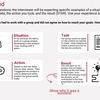Interviews are an opportunity for a recruiter to learn more about you! Employers will assess how your skills and experiences fit into their company and the role they are seeking to fill. Your interview is a way to show why they should hire you - share your skills, abilities, and experiences. Interviewing can be a challenge and a little intimidating, and the Career Center is here to help you every step of the way.
Remember: you are interviewing the company as much as they are interviewing you. Keep an eye out for any red flags, and make sure the company aligns with your values. If you need help finding jobs that are right for you, check out our job search resources!


